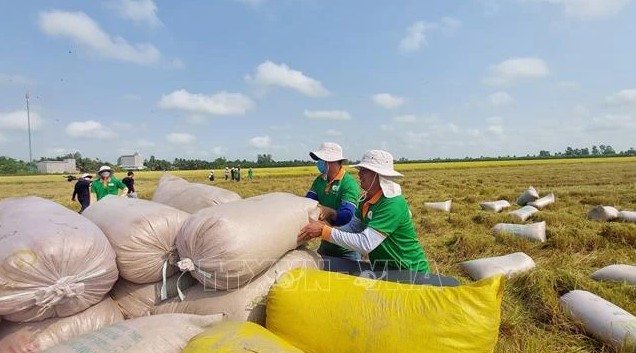
While Vietnam’s rice export prices are the highest in the world, local businesses have prioritized exporting premium-quality rice, importing lower-cost varieties for domestic use.
Vietnamese rice, currently priced higher than competitors such as Thailand and India, has set export records in both value and volume in 2024.
Vietnamnet, December 06, 2024
According to a report from the Ministry of Agriculture and Rural Development (MARD), Vietnam exported 700,000 tons of rice in November, earning nearly $445 million. By the end of November, total rice exports had surged to nearly 8.5 million tons, generating $5.31 billion in revenue.
This represents a 10.6% increase in volume and a 22.4% rise in value compared to the same period last year, marking a historic record in both volume and export value for Vietnamese rice.
The average export price of Vietnamese rice for the first 11 months of 2024 reached $627.9 per ton, up 10.6% year-on-year.
Data from the Vietnam Food Association shows that Vietnamese 5% broken rice is currently the most expensive among top global exporters. As of December 3, it was priced at $517 per ton – $18 higher than Thai rice, $64 more than Pakistani rice, and $66 above Indian rice of the same category.
As of October 2024, the Philippines remains the largest market for Vietnamese rice, accounting for 46.1% of exports. Indonesia and Malaysia follow, with market shares of 13.5% and 8.2%, respectively.
Compared to the same period in 2023, rice export values to the Philippines rose by 59.1% during the first 10 months of 2024. Exports to Indonesia increased by 20.2%, while those to Malaysia more than doubled, rising 2.2 times.
However, exports to China saw a sharp decline, dropping 71.3% compared to the same period last year.
Deputy Minister of Agriculture and Rural Development Phung Duc Tien revealed that Vietnam’s rice sector recorded a trade surplus of $4.07 billion in the past 11 months, up 14.6%. At the same time, domestic enterprises spent $1.24 billion importing various types of rice to meet domestic consumption and production demands.
Experts and businesses explain that Vietnam’s rice export prices are significantly higher than those of other countries. Consequently, local rice is prioritized for export, while lower-grade rice – used for making noodles, rice paper, and other products – is more cost-effective to import.
Deputy Minister Tien emphasized Vietnam’s shift toward higher-value, quality rice with lower emissions. Currently, 95% of Vietnam’s rice varieties are high-quality strains, and 89% of the rice output is classified as high-quality.
Despite India resuming its rice exports, Vietnam’s average export price remains steady at $627 per ton.
“If Vietnam successfully implements its plan for one million hectares of high-quality, low-emission rice, the value of the rice sector will further increase. This will cement our competitive advantage on the global stage,” Tien stated.
Tam An
